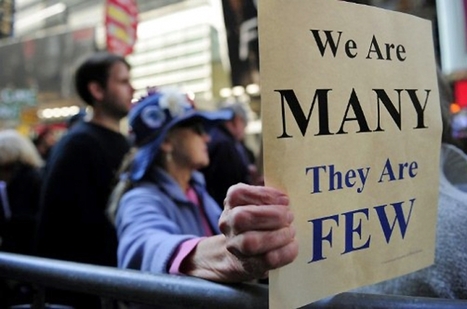Les indignés de Wall street protestent contre les financiers à l'origine de la crise, l'inégalité croissante et les défaillances des politiques, qu'ils accusent d'être soumis aux grands patrons de la finance ou des entreprises. Ils affirment représenter les aspirations de 99% des américains, arguant que 1% de la population possède l'essentiel des richesses et est constamment privilégié.
Lucas Jackson / Reuters
Le cabinet de lobbying Clark Lytle Geduldig & Cranford a proposé à l'Association des banques américaines de monter un plan média de 850.000 dollars afin de déconsidérer le mouvement Occupy Wall Street.
Des lobbyistes réputés, liés aux banques, ont proposé un plan de 850.000 dollars pour attaquer le mouvement Occupy Wall Street (OWS) et les hommes politiques qui lui seraient favorables, a rapporté samedi la chaîne de télévision américaine MSNBC. Dans un mémo de quatre pages, la firme de Washington Clark Lytle Geduldig & Cranford (CLGC) propose à l'Association des banques américaines (ABA) de mener une "recherche" sur Occupy Wall Street pour "construire un récit négatif" sur le mouvement, "à placer dans les médias", ainsi que sur "ceux qui les soutiennent", selon ce mémo publié par MSNBC. Si les démocrates soutiennent OWS, "cela voudrait dire davantage qu'une gêne passagère pour Wall Street. Cela peut avoir un impact de très longue durée, politique et financier, pour les compagnies au coeur" de Wall Street, ajoute ce mémo.
"C'est peut-être facile de rejeter OWS comme un groupe de manifestants désordonnés mais ils ont démontré qu'ils devaient plutôt être traités comme des concurrents organisés, très habiles et capables de travailler les médias. Pour contrer cela, nous devons faire de même", écrit CLGC qui s'inquiète également d'un possible terrain d'entente entre le Tea Party et Occupy Wall Street, qui pourrait devenir "explosif".
Deux des associés de CLGC travaillaient précédemment pour John Boehner, le républicain président de la chambre des représentants, selon MSNBC. Un porte-parole de l'ABA a confirmé avoir reçu ce mémo. "Nous ne l'avions pas demandé et nous avons décidé de ne pas y donner suite", a-t-il précisé à "Up w/Chris Hayes", l'émission de MSNBC qui en a fait état.
Le mouvement Occupy Wall Street, né il y a deux mois à New York, dénonce la cupidité du monde de la finance et les 1% les plus riches. Un an avant les élections présidentielles et législatives, il assure vouloir rester indépendant.



 Your new post is loading...
Your new post is loading...







